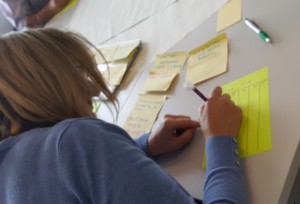

Latest research and knowledge exchange news at Bournemouth University



Congratulations to Prof. Ann Brooks in FHSS on the publication of her latest book Genealogies of Emotions, Intimacies and Desire: Theories of Changes in Emotional Regimes from Medieval Society to Late Modernity. The book has a Foreword by David Konstan (NYU) and it is published by Routledge.
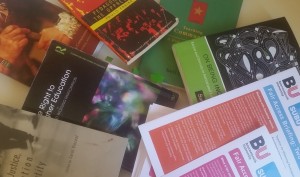
We’ve been finding out how people working in higher education learn, think and feel about and put into practice widening participation.
Exploring the idea of widening participation as a process of organisational learning aligns with the core strategy of BU’s innovative Fair Access Research project — through working and learning together we can make a difference for students, where we work, how we work, yourselves and society.
At a time of uncertainty and inequality in society and great changes in the sector, finding ways for us all to learn together in kinder and more effective ways matters.
Over the summer we have been doing some fieldwork and collecting sector-wide survey data to establish how different people in different organisations learn about widening participation.
We want to know how you, here at BU, understand, learn about and practice widening participation. We’ve designed a survey to capture your voices and experiences.
In July we had the privilege of meeting with colleagues from across the university to explore some of these issues – we want to open that invitation to more of you through this survey.
For more information about the organisational learning project, email Dr Maggie Hutchings on mhutchings@bournemouth.ac.uk
For more information about BU’s innovative Fair Access Research, email the Principal Investigators, Dr Vanessa Heaslip (vheaslip@bournemouth.ac.uk) and Dr Clive Hunt (chunt@bournemouth.ac.uk)
To complete and share the survey follow this link.
 From 12 September, the Centre for Excellence in Learning (CEL) is holding a photo exhibition in Poole House, next to the Cash Office. This exhibition is part of the ‘Students who bounce back’ project, a study funded by Bournemouth University’s Fair Access Agreement Management Group. The study is being conducted by researchers at CEL, in co-production with student carers*.
From 12 September, the Centre for Excellence in Learning (CEL) is holding a photo exhibition in Poole House, next to the Cash Office. This exhibition is part of the ‘Students who bounce back’ project, a study funded by Bournemouth University’s Fair Access Agreement Management Group. The study is being conducted by researchers at CEL, in co-production with student carers*.
The photographs displayed in the exhibition were taken by student carers as part of a photodiary exercise. Some of them also came to the University this week to formally launch the exhibition.
‘Students who bounce back’ has the following objectives:
The exhibition will be on display for six weeks. For more information about the project, email Jacqueline Priego.
*A carer is defined as anyone who cares, unpaid, for a family member who, due to illness, disability, a mental health problem or an addiction, cannot cope without their support.
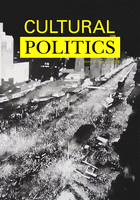 Congratulations to FHSS Prof. Ann Brooks on her latest academic article in the July issue of Cultural Politics. The article ‘The Cultural Production of Consumption as Achievement’ is co-authored with Lionel Wee.
Congratulations to FHSS Prof. Ann Brooks on her latest academic article in the July issue of Cultural Politics. The article ‘The Cultural Production of Consumption as Achievement’ is co-authored with Lionel Wee.
The Cultural Production of Consumption as Achievement Cultural PoliticsCultural Politics (2016) 12 (2): 217-232
doi 10:10.1215/17432197-3592112
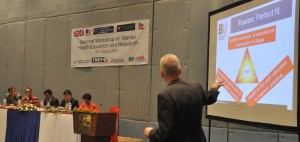 We have written in many previous BU blogs about progress of our THET-funded project in southern Nepal (e.g. here AND here ). Today’s blog reflects on the use on BU’s unique FUSION approach in our project ‘Mental Health Training for Maternity Care Providers in Nepal‘.
We have written in many previous BU blogs about progress of our THET-funded project in southern Nepal (e.g. here AND here ). Today’s blog reflects on the use on BU’s unique FUSION approach in our project ‘Mental Health Training for Maternity Care Providers in Nepal‘.
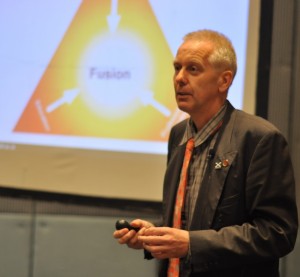 Our BU-led project brings highly experienced health professionals, such as midwives, health visitors or mental health nurses, to Nepal to work as volunteer trainers. The training is aimed at community-based maternity care practitioners and addresses key mental health issues relevant to pregnancy and for new mothers and offers the required communication skills. These health professionals will bring their experience as health care providers as well as trainers in the field of mental health and maternity care/midwifery, mental ill-health prevention and health promotion. They volunteer for two to three weeks at a time to design and deliver training in southern Nepal.
Our BU-led project brings highly experienced health professionals, such as midwives, health visitors or mental health nurses, to Nepal to work as volunteer trainers. The training is aimed at community-based maternity care practitioners and addresses key mental health issues relevant to pregnancy and for new mothers and offers the required communication skills. These health professionals will bring their experience as health care providers as well as trainers in the field of mental health and maternity care/midwifery, mental ill-health prevention and health promotion. They volunteer for two to three weeks at a time to design and deliver training in southern Nepal.
 The Centre for Midwifery & Maternal Health (CMMPH) collaborates in this project with Liverpool John Moores University (LJMU), the Department of Health, and Physical & Population Education at Nepal’s oldest university Tribhuvan University’s (TU). The project is supported in the field by a local charity called Green Tara Nepal. Our project is part of the Health Partnership such as Nepal. HPS itself is funded by the UK Department for International Development and managed by THET (Tropical and Health Education Trust).
The Centre for Midwifery & Maternal Health (CMMPH) collaborates in this project with Liverpool John Moores University (LJMU), the Department of Health, and Physical & Population Education at Nepal’s oldest university Tribhuvan University’s (TU). The project is supported in the field by a local charity called Green Tara Nepal. Our project is part of the Health Partnership such as Nepal. HPS itself is funded by the UK Department for International Development and managed by THET (Tropical and Health Education Trust).
 Our maternal mental health project is a good example of BU’s FUSION approach as it combines EDUCATION (through the training of Auxiliary Nurse-Midwives in Nepal) by UK volunteers (representing PRACTICE) through an intervention which is properly evaluated (representing RESEARCH) is a perfect example of BU’s FUSION in action. Moreover, the project will be partly evaluated by FHSS’s Preeti Mahato as part of her PhD thesis research. This PhD project is supervised by Dr. Catherine Angell (CEL & CMMPH), BU Visiting Professor Padam Simkhada (based at LJMU) and CMMPH’s Prof. Edwin van Teijlingen.BU’s focus on the FUSION of research, education and professional practice is a unique variant of the way UK universities (and many abroad) blend academic teaching, research and scholarship. FUSION is a key concept derived from BU’s strategic Vision & Values).
Our maternal mental health project is a good example of BU’s FUSION approach as it combines EDUCATION (through the training of Auxiliary Nurse-Midwives in Nepal) by UK volunteers (representing PRACTICE) through an intervention which is properly evaluated (representing RESEARCH) is a perfect example of BU’s FUSION in action. Moreover, the project will be partly evaluated by FHSS’s Preeti Mahato as part of her PhD thesis research. This PhD project is supervised by Dr. Catherine Angell (CEL & CMMPH), BU Visiting Professor Padam Simkhada (based at LJMU) and CMMPH’s Prof. Edwin van Teijlingen.BU’s focus on the FUSION of research, education and professional practice is a unique variant of the way UK universities (and many abroad) blend academic teaching, research and scholarship. FUSION is a key concept derived from BU’s strategic Vision & Values).
Prof. Edwin van Teijlingen
CMMPH
The following funding opportunities have been announced. Please follow the links for more information.
Economic and Social Research Council
The Economic and Social Research Council, under the Research Councils UK and Fonds National de la Recherche, Luxembourg, bilateral agreement, invites proposals for its Research Grants Scheme. The scheme supports collaborative research in any area of social sciences within the remit of both ESRC and FNR. The UK part of the project must be a minimum of £350,000 and no more than £1 million (at 100% fEC).
Maximum award: £1 million. Closng date: 31/12/16.
Natural Environment Research Council
The Natural Environment Research Council, in collaboration with the Engineering and Physical Sciences Research Council and the Indian Department of Science and Technology, invites applications for their Water Quality in India Scoping Workshop. The workshop will take place in Delhi on 17th and 18th November 2016 and the aims of the workshop will be: to define the scope of a potential new UK/India interdisciplinary programme focussed on research contributing to improved water quality, and through this support the economic development and welfare of India; to facilitate links between the UK and Indian research communities in the area of water quality research.
Applications from researchers working in the fields of water quality, water engineering and related disciplines are welcome. NERC and EPSRC will cover all reasonable travel and subsistence expenses for UK participants attending the workshop.
Maximum award: Not specified. Closing date: 16/09/16.
The Natural Environment Research Council, under its Discovery Science programme, invites applications for its Standard Research Grants. Discovery Science is a key component of delivering the strategy of NERC and is intended to facilitate the identification of the next generation of strategic priorities. The minimum that can be requested per complete proposal and per component is £65,000 and the maximum for complete proposal is £800,000 at 100 per cent full economic cost.
You must speak to your DDRPP and your Funding Development Officer before applying to this call. Bournemouth University can submit one application per round and operates a demand management process.
Maximum award: £640,000 (at 80% fEC). Closing date: 17/01/17.
Wellcome Trust
The Wellcome Trust invites submissions for its Wellcome Book Prize. The award is open to new works of fiction or non-fiction published by a UK based publisher or in-print between 1st January 2016 and 31 December 2016 (for the 2017 prize).
A book should have a central theme that engages with some aspect of medicine, health or illness. This can cover many genres of writing – including crime, romance, popular science, sci fi and history. The subjects these books might include birth and beginnings, illness and loss, pain, memory, and identity. The Wellcome Book Prize aims to excite public interest and encourage debate around these topics. Academic textbooks, scholarly monographs, diet books and picture-led books are not eligible, even if they are relevant to medicine or medical science.
Maximum award: £30,000. Closing date: 09/09/16 (recurring).
If you are interested in submitting to any of the above calls you must contact RKEO with adequate notice before the deadline. Please note that some funding bodies specify a time for submission as well as a date. Please confirm this with your RKEO Funding Development Officer.
You can set up your own personalised alerts on Research Professional. If you need help setting these up, just ask your School’s/Faculty’s Funding Development Officer in RKEO or view the recent blog post here. If you are thinking of applying, why not add an expression of interest on Research Professional so that BU colleagues can see your intention to bid and contact you to collaborate.
 Congratulations to Dr. Pramod Regmi as the lead author of the paper ‘Informed consent in health research: challenges and barriers in low-and middle-income countries with specific reference to Nepal‘ [1]. Informed consent is a process whereby potential participants are genuinely informed about their role, risk and rights before they are enrolled in the study. Thus, ethics committees in most countries require ‘informed consent form’ as part of an ethics application which is reviewed before granting research ethics approval. Despite a significant increase in health research activity in low-and middle-income countries (LMICs) in recent years, only limited work has been done to address ethical concerns.
Congratulations to Dr. Pramod Regmi as the lead author of the paper ‘Informed consent in health research: challenges and barriers in low-and middle-income countries with specific reference to Nepal‘ [1]. Informed consent is a process whereby potential participants are genuinely informed about their role, risk and rights before they are enrolled in the study. Thus, ethics committees in most countries require ‘informed consent form’ as part of an ethics application which is reviewed before granting research ethics approval. Despite a significant increase in health research activity in low-and middle-income countries (LMICs) in recent years, only limited work has been done to address ethical concerns.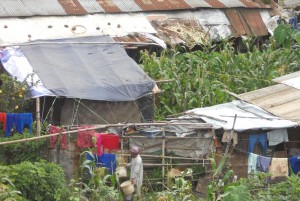
Most ethics committees in LMICs lack the authority and/or the capacity to monitor research in the field. This is important since not all research, particularly in LMICs region, complies with ethical principles, sometimes this is inadvertently or due to a lack of awareness of their importance in assuring proper research governance. With several examples from Nepal, this paper reflects on the steps required to obtain informed consents and highlights some of the major challenges and barriers to seeking informed consent from research participants. The authors offer some recommendations around how can we can promote and implement optimal informed consent taking process.
The paper will appear later this year in the international journal Developing World Bioethics (publisher: Wiley). Finally, just out of interest five out of six of the authors are graduates of the University of Aberdeen!
Prof. Edwin van Teijlingen
CMMPH
Reference:
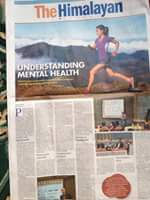
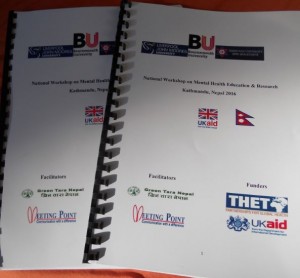 At the National Workshop on Mental Health Education & Research in Kathmandu organised by Tribhuvan University, Bournemouth University and Liverpool John Moores University last week we had quite a few television camera crews and journalists present. Sabitri Dhakal, one of the journalists from The Himalayan Times an English-language daily newspaper in Nepal, wrote a nice feature length article. This piece was based on interviews with BU Visiting Faculty Padam Simkhada and Prof. Edwin van Teijlingen conducted at our workshop. Her article with the title ‘Understanding Mental Health’ is available online.
At the National Workshop on Mental Health Education & Research in Kathmandu organised by Tribhuvan University, Bournemouth University and Liverpool John Moores University last week we had quite a few television camera crews and journalists present. Sabitri Dhakal, one of the journalists from The Himalayan Times an English-language daily newspaper in Nepal, wrote a nice feature length article. This piece was based on interviews with BU Visiting Faculty Padam Simkhada and Prof. Edwin van Teijlingen conducted at our workshop. Her article with the title ‘Understanding Mental Health’ is available online.
Mental health in pregnant women and new mothers is increasing recognised on the global health agenda. In Nepal mental health is generally a difficult to topic to discuss. THET, a London-based organisation, funded Bournemouth University, and Liverpool John Moores University in the UK and Tribhuvan University in Nepal to train community-based maternity 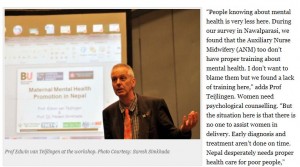 workers on issues around mental health. Thus far three groups of UK health and education experts have gone out to Nepal to train these communit maternity care providers, called Auxiliary Nurse Midwives (ANMs). ANMs, who are the key maternity service providers in rural birthing centres of Nepal, have received only 18 months of training and the training curriculum does not refer to dealing with mental health issues. The next group of volunteers is due to travel in September.
workers on issues around mental health. Thus far three groups of UK health and education experts have gone out to Nepal to train these communit maternity care providers, called Auxiliary Nurse Midwives (ANMs). ANMs, who are the key maternity service providers in rural birthing centres of Nepal, have received only 18 months of training and the training curriculum does not refer to dealing with mental health issues. The next group of volunteers is due to travel in September.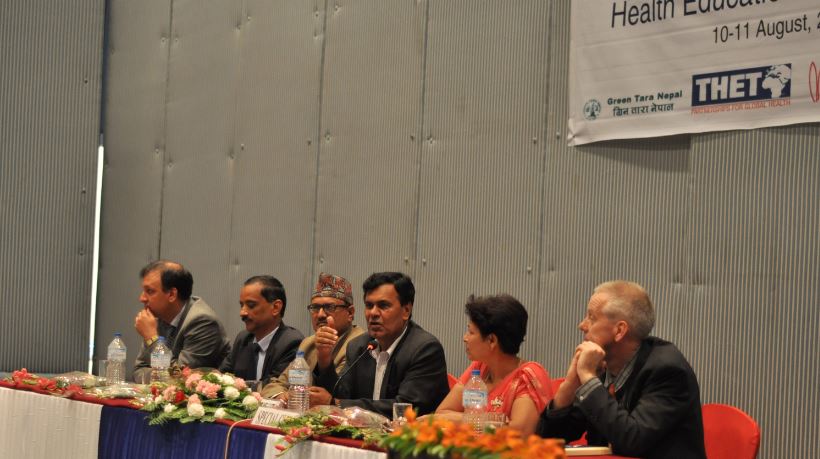
Prof. Edwin van Teijlingen
CMMPH
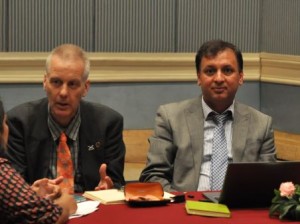 At a television interview this morning in Kathmandu I was asked how many papers I had published on health and health-related issues in Nepal. I told the interviewer from BTV Business that it was around 90 to a hundred. Coming back to Green Tara Nepal office I decide to update the list of papers on Nepal to make sure I had not lied too much on TV.
At a television interview this morning in Kathmandu I was asked how many papers I had published on health and health-related issues in Nepal. I told the interviewer from BTV Business that it was around 90 to a hundred. Coming back to Green Tara Nepal office I decide to update the list of papers on Nepal to make sure I had not lied too much on TV.
Adding up the papers, editorials and, to a lesser extent, book chapters I was pleasantly surprised that there were 25 on maternity care & midwifery, 18 on sexual & reproductive health, nine on infectious diseases, five on non-communicable diseases, six on nutrition & child health, three on mental health, two on migration and a further mixture of 38 on topics such as health systems, research methods, or health & education capacity building. If I have not double counted any of the papers that a grand total of 106. Most are co-authored with BU Visiting Faculty Prof.Padam Simkhada (from Liverpool John Moores University), many with PhD students conducting projects in Nepal and, more recently with BU post-doctoral fellow Dr. Pramod Regmi.
Prof. Edwin van Teijlingen
CMMPH
Reference (by topic)
Maternal & Neonatal Health & Midwifery
Sexual & Reproductive Health
Infectious diseases
Non-Communicable Diseases
Nutrition & Child Development
Mental Health
Migration / Occupational Health
Other (including: health systems, research methods, capacity building)
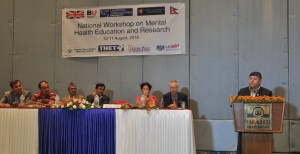 Today we completed the second day of training of health teachers, lecturers in nursng, public health and the like in Kathmandu. We called it the National Workshop on Mental Health Education & Research and this two-day workshop was held in a hotel in Kathmandu. It was organised by Tribhuvan University in collaboration with Bournemouth University and Liverpool John Moores University (LJMU). Mental health is high on the global agenda and want to raise the issue more in Nepal. The three universities are working together on an education intervention training Auxiliary Nurse Midwives in Nawalparasi on mental health issues and mental health promotion. The project is funded under the Health Partnership Scheme (HPS) from DfID and managed by THET (Tropical Health & Education Trust).
Today we completed the second day of training of health teachers, lecturers in nursng, public health and the like in Kathmandu. We called it the National Workshop on Mental Health Education & Research and this two-day workshop was held in a hotel in Kathmandu. It was organised by Tribhuvan University in collaboration with Bournemouth University and Liverpool John Moores University (LJMU). Mental health is high on the global agenda and want to raise the issue more in Nepal. The three universities are working together on an education intervention training Auxiliary Nurse Midwives in Nawalparasi on mental health issues and mental health promotion. The project is funded under the Health Partnership Scheme (HPS) from DfID and managed by THET (Tropical Health & Education Trust).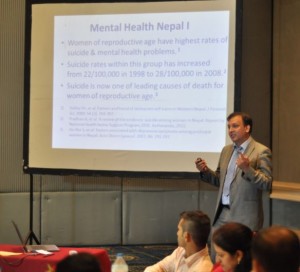
Key speakers on the first day of the workshop included: the VC of Tribhuvan University, Dr Gangalal Tuladhar MP and former Education Minister of Nepal, Dr Khem Karki (head of the Nepal Health Research Council), Dr Chandra Kala Sharma, Prof Shyam Krishna Maharjan and Prof Krishna Acharya.
This workshop is part of this capacity building process and the audience of largely university and college lecturers will take some of the learning back with them to improve the education of health workers in Nepal.
The second day of the workshop concentrateed on research methods for community-based projects such as this our THET funded one in the mental health field. Prof. Edwin van Teijlingen reminded the audience that it is important that novel mental health interventions like ours are properly evaluated, and that the people doing the evaluations have the appropriate rese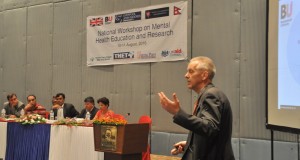 arch skills. The next group of UK volunteers are due to travel to Nepal in September.
arch skills. The next group of UK volunteers are due to travel to Nepal in September.
Prof. Edwin van Teijlingen
CMMPH
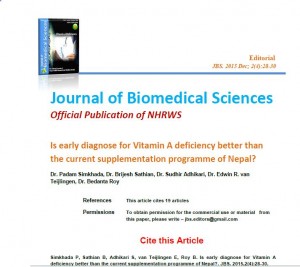 This week we published an editorial in the Journal of Biomedical Sciences on the question: “Is early diagnose for Vitamin A deficiency better than the current supplementation programme of Nepal?”
This week we published an editorial in the Journal of Biomedical Sciences on the question: “Is early diagnose for Vitamin A deficiency better than the current supplementation programme of Nepal?”
The editorial concludes that prevention is still better than cure, but instead of a mass Vitamin A supplementation in Nepal, we need a health promotion intervention aiming to increase the intake of relatively cheap vegetables and fruit (containing β carotene). In addition we need better surveillance and help to identify children with Vitamin A Deficiency and provide them with Vitamin A supplements. The primary focus should be on adopting sustainable food based approaches to combat vitamin A deficiency. In Public Health terms: rather than a blanket coverage of Vitamin A supplementation to whole population we should consider a targeted intervention aimed at those who need it most.
Reference:
Simkhada P, Sathian B, Adhikari S, van Teijlingen E, Roy B. (2015) Is early diagnose for Vitamin A deficiency better than the current supplementation programme of Nepal?. J Biomed Sci. 2(4):28-30.
http://www.nepjol.info/index.php/JBS/index
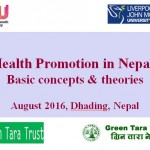 Today and yesterday Green Tara Nepal (GTN) staff spent discussing and planning their health promotion intervention in the district of Dhading. The sessions included feedback by the GTN on progress to-date as well as a discussion of their perceptions of the various relevant health needs in the community. BU has been working with GTN for over seven years. [1] Yesterday BU professor Edwin van Teijlingen gave an interactive workshop on communication skills. This morning BU’s Visiting Professor Padam Simkhada from Liverpool John Moores University (LJMU) outlined key health promotion concepts and theories to the fieldworkers.
Today and yesterday Green Tara Nepal (GTN) staff spent discussing and planning their health promotion intervention in the district of Dhading. The sessions included feedback by the GTN on progress to-date as well as a discussion of their perceptions of the various relevant health needs in the community. BU has been working with GTN for over seven years. [1] Yesterday BU professor Edwin van Teijlingen gave an interactive workshop on communication skills. This morning BU’s Visiting Professor Padam Simkhada from Liverpool John Moores University (LJMU) outlined key health promotion concepts and theories to the fieldworkers.
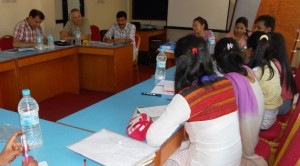 This particular post-disaster health promotion project grew out of years of research-based interventions run by GTN and the needs seen in areas affected by last years’ serious earthquakes in Nepal. The project has received support from various funding agencies, including Green Tara Trust, a London-based Buddhist charity. The training is being held in Dhadingbesi, about four hours drive away from the capital Kathmandu. The various photos with this blog show the results of a social mapping exercise. These included some beautifully hand-drawn maps of the individual wards in the area, indicating where the health post is situated, but more importantly the house of currently pregnant women.
This particular post-disaster health promotion project grew out of years of research-based interventions run by GTN and the needs seen in areas affected by last years’ serious earthquakes in Nepal. The project has received support from various funding agencies, including Green Tara Trust, a London-based Buddhist charity. The training is being held in Dhadingbesi, about four hours drive away from the capital Kathmandu. The various photos with this blog show the results of a social mapping exercise. These included some beautifully hand-drawn maps of the individual wards in the area, indicating where the health post is situated, but more importantly the house of currently pregnant women.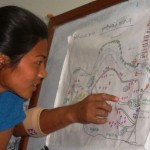
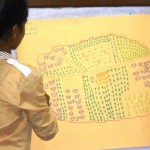 Several GTN project have been, or ar currently, evaluated by FHSS Ph.D. students. The GTN project in Pharping has been evaluated by Sheetal Sharma, who has published several papers from this research.[2-4] The GTN project in Nawalparasi is currently being studied by Preeti Mahato, who has also already published from her thesis research despite being less than halfway through. [5] Prof. Padam Simkhada is external supervisor for both these BU Ph.D students.
Several GTN project have been, or ar currently, evaluated by FHSS Ph.D. students. The GTN project in Pharping has been evaluated by Sheetal Sharma, who has published several papers from this research.[2-4] The GTN project in Nawalparasi is currently being studied by Preeti Mahato, who has also already published from her thesis research despite being less than halfway through. [5] Prof. Padam Simkhada is external supervisor for both these BU Ph.D students.
Prof. Edwin van Teijlingen
CMMPH
References:
 Dr. Pramod Regmi in FHSS published his latest paper today in the South East Asia Journal of Public Health. The paper ‘Priority public health interventions and research agendas in post-earthquake Nepal’ is co-authored with researchers based in New Zealand, Nepal and the UK [1]. The authors reminds the readers that natural disasters cause huge damage to infrastructure, economies as well as population health. Nepal’s 2015 earthquake has multiple effects on population health and health services delivery. Many public health facilities, mostly health posts or sub-healthposts, were damaged or completely destroyed. Priority health services such as immunisation and antenatal care were also seriously affected.
Dr. Pramod Regmi in FHSS published his latest paper today in the South East Asia Journal of Public Health. The paper ‘Priority public health interventions and research agendas in post-earthquake Nepal’ is co-authored with researchers based in New Zealand, Nepal and the UK [1]. The authors reminds the readers that natural disasters cause huge damage to infrastructure, economies as well as population health. Nepal’s 2015 earthquake has multiple effects on population health and health services delivery. Many public health facilities, mostly health posts or sub-healthposts, were damaged or completely destroyed. Priority health services such as immunisation and antenatal care were also seriously affected.
 The earthquake has prompted the need for a disaster-related population-health-research agenda as well as renewed disaster strategy in post-earthquake Nepal. Meanwhile, it also unveiled the gap in knowledge and practice regarding earthquake resilience in Nepal. The paper arues that there is an opportunity for school-based and community-based interventions in both disaster preparedness and resilience. Nepal can build on experiences from other countries as well as from its own. We have discussed possible impacts of the Nepal earthquake on population health and health system infrastructures. We have also suggested possible public health interventions bestowing active awareness among the population and a research agenda in this regard. We strongly urge for the translation of the National Health Policy (2014) into action, as it prioritizes the need of an earthquake resistant infrastructure as well as the implementation of a disaster response plan.
The earthquake has prompted the need for a disaster-related population-health-research agenda as well as renewed disaster strategy in post-earthquake Nepal. Meanwhile, it also unveiled the gap in knowledge and practice regarding earthquake resilience in Nepal. The paper arues that there is an opportunity for school-based and community-based interventions in both disaster preparedness and resilience. Nepal can build on experiences from other countries as well as from its own. We have discussed possible impacts of the Nepal earthquake on population health and health system infrastructures. We have also suggested possible public health interventions bestowing active awareness among the population and a research agenda in this regard. We strongly urge for the translation of the National Health Policy (2014) into action, as it prioritizes the need of an earthquake resistant infrastructure as well as the implementation of a disaster response plan.
Reference:
Regmi, PR, Aryal, N., Pant, PR, van Teijlingen, E., Simkhada, P., Devkota, B. (2015) Priority public health interventions and research agendas in post-earthquake Nepal South East Asia Journal of Public Health 5(2): 7-12 (http://www.banglajol.info/index.php/SEAJPH/article/view/28307/18835 )
 Last week’s Festival of Learning debate on the motion: “Advising pregnant women to avoid drinking alcohol during pregnancy is symptom of the Nanny State and another step towards the medicalisation of childbirth” has just been hightlighted in the USA. Our work featured on Jeffery Nicholas’ thoughts on social reality, a site established by Prof. Jeff Nicholas (click here!). Prof. Nicholas is a philospher based at Providence College with an interest in midwifery in society.
Last week’s Festival of Learning debate on the motion: “Advising pregnant women to avoid drinking alcohol during pregnancy is symptom of the Nanny State and another step towards the medicalisation of childbirth” has just been hightlighted in the USA. Our work featured on Jeffery Nicholas’ thoughts on social reality, a site established by Prof. Jeff Nicholas (click here!). Prof. Nicholas is a philospher based at Providence College with an interest in midwifery in society.
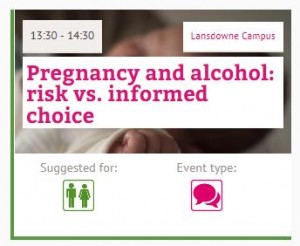
Faculty of Health & Social Sciences’ Liz Norton and Edwin van Teijlingen affiliated with the Centre for Midwifery, Maternal & Perinatal Health (CMMPH) argued in favour of the motion. Donna Wixted, Joint Bournemouth University (BU)-Portsmouth Hospitals NHS Trust, doctoral student and Greta Westwood of Portsmouth Hospitals NHS Trust & the University of Southampton argued strongly against the motion. The exciting debate was chaired by Prof. Vanora Hundley from the Faculty of Health & Social Sciences.
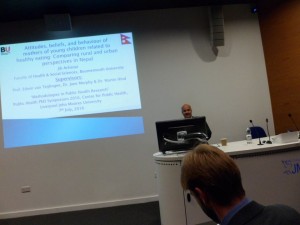 Mr. Jib Acharya (FHSS) gave an interesting presentation yesterday about the qualitative research findings of his PhD at Liverpool John Moores University. Jib’s PhD research focused on the knowledge, attitudes and beliefs of poor women in Nepal about healthy eating and the study also identifies major food barriers.
Mr. Jib Acharya (FHSS) gave an interesting presentation yesterday about the qualitative research findings of his PhD at Liverpool John Moores University. Jib’s PhD research focused on the knowledge, attitudes and beliefs of poor women in Nepal about healthy eating and the study also identifies major food barriers.
His mixed-methods approach combines a quantitative questionnaire survey with qualitative research. Jib’s research project is supervised by Dr. Jane Murphy, Dr. Martin Hind and Prof. Edwin van Teijlingen. Some of the preliminary findings of this FHSS thesis have already been published in two scientific journals [1-2].
References:
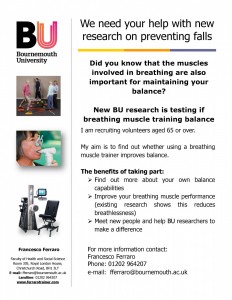
 Today saw the publication in BMC Pregnancy & Childbirth of the paper ‘Dirty and 40 days in the wilderness: Eliciting childbirth and postnatal cultural practices and beliefs in Nepal’ with as lead author FHSS PhD student Sheetal Sharma [1]. This paper argues that pregnancy and childbirth are very much socio-cultural events that carry varying meanings across different societies and cultures. These are often translated into social expectations of what a particular society expects women to do (or not to do) during pregnancy, birth and/or the postnatal period. The study explored beliefs around childbirth in Nepal, a low-income country with a largely Hindu population. The paper then sets these findings in the context of the wider global literature around issues such as periods where women are viewed as polluted (or dirty even) after childbirth.
Today saw the publication in BMC Pregnancy & Childbirth of the paper ‘Dirty and 40 days in the wilderness: Eliciting childbirth and postnatal cultural practices and beliefs in Nepal’ with as lead author FHSS PhD student Sheetal Sharma [1]. This paper argues that pregnancy and childbirth are very much socio-cultural events that carry varying meanings across different societies and cultures. These are often translated into social expectations of what a particular society expects women to do (or not to do) during pregnancy, birth and/or the postnatal period. The study explored beliefs around childbirth in Nepal, a low-income country with a largely Hindu population. The paper then sets these findings in the context of the wider global literature around issues such as periods where women are viewed as polluted (or dirty even) after childbirth.
Sheetal is doing ve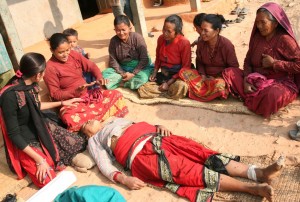 ry well with her PhD publications as a few weeks ago her major quantitative findings paper was published in PLOS One [2]. Both papers are published in Open Access journals and therefore easily available to researchers, health promotors, health care providers and health policy-makers in low-income countries. Sheetal evaluated a research project funded by the London-based charity Green Tara Trust. Her PhD is supervised by Dr. Catherine Angell, Prof. Vanora Hundley and Prof. Edwin van Teijlingen all nbased in CMMPH with external supervision from BU Visiting Faculty Prof. Padam Simkhada (liverpool John Moores University).
ry well with her PhD publications as a few weeks ago her major quantitative findings paper was published in PLOS One [2]. Both papers are published in Open Access journals and therefore easily available to researchers, health promotors, health care providers and health policy-makers in low-income countries. Sheetal evaluated a research project funded by the London-based charity Green Tara Trust. Her PhD is supervised by Dr. Catherine Angell, Prof. Vanora Hundley and Prof. Edwin van Teijlingen all nbased in CMMPH with external supervision from BU Visiting Faculty Prof. Padam Simkhada (liverpool John Moores University).
References: